Each weekend I wonder who I’m going to meet around the Bear Brook campground, how many people are going to come to my programs, and then I cross my fingers for beautiful weather. One of the many things I love about this job is interacting with so many friendly people, and gaining a slight glimpse into their trip to Bear Brook. I always hope for a little something extra, though. I hope to enhance camper’s experiences and have a special impact on their camping trip. A smile spread across a child’s face as they pick up a moose antler usually satisfies my goals, but every now and then something truly special happens.
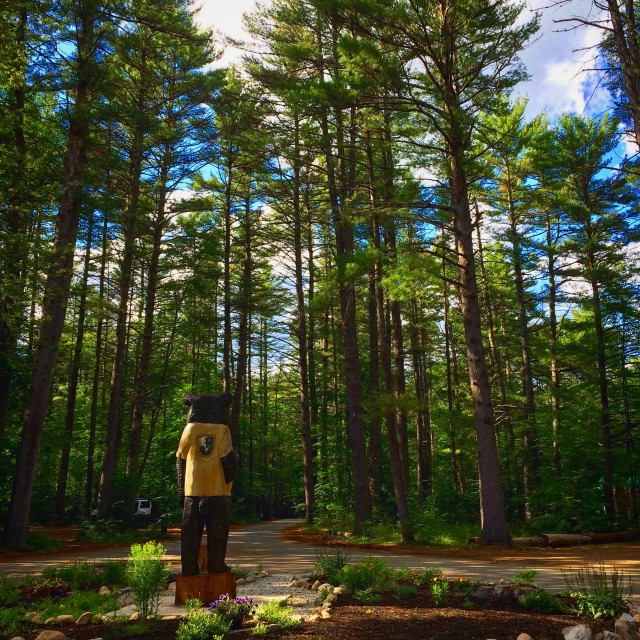
Earlier this summer I was trying out a program called “Sense of Wonder.” I named it after one of my favorite sources of inspiration, Rachel Carson’s short book entitled A Sense of Wonder. I wanted this program to include art, music, and poetry, all while developing new connections with these art forms and nature for the attendees. The first week I advertised it no one came, then the second week it rained, and the third week I sat waiting around for 10 minutes before getting up to walk back to camp discouraged again. As I was putting my backpack on, a woman named Elaine walks up, hoping it’s not too late. I was immediately ecstatic to finally be able to do this program! She knew of a group of women who might also like to come, so we walked over to their campsite and met an awesome group of singers from Boston who like to go camping and kayaking, while driving around in their VW bus. Three of those women stopped what they were doing once Elaine and I explained what we were about to do and joined us on our adventure. We got to know each other on our walk to Spruce Pond, one of my favorite spots in Bear Brook. They were interested in the SCA program I’m doing, so I walked them past a couple of the old CCC cabins we live in. From our camp we took another path to Spruce Pond. Since my ultimate goal of this program was to temporarily transport our minds to back to our childhood when we were amazed at the simplest things, I had them crumple up a wintergreen leaf and smell it the same way I had my fourth graders do it, and they actually had similar reactions to the leaf’s fresh scent.
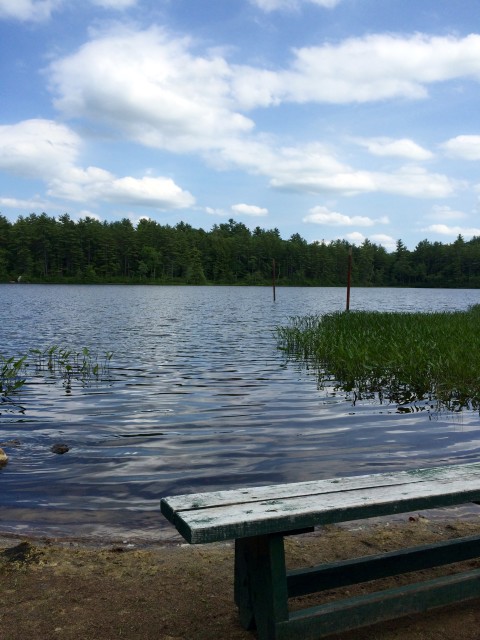
We sat on two green benches facing the water. It was a beautiful afternoon. I start off discussing how American poet Robert Frost lived in NH and had his honeymoon right here in Allenstown, then I read one of the poems he wrote whilst in NH, “Nothing Gold Can Stay.” From there, I hand out a small board to write on, paper, and a pencil. We write down the first word or phrase that comes to our minds with each item I pass around next. I pass around a jar with fresh oregano and sage from my garden in it to smell, a box with a beaver pelt inside to feel, a small mirror sitting in the bottom of a brown paper bag to see, and lastly, I played Grieg’s Morning Mood from his Peer Gynt Suite to listen to. With these four words we each wrote a poem. The poems these women wrote shocked me, moved me, and deeply inspired me. They were beautifully written and gave us a glimpse into their lives. One of the women from Boston shared that her mother always took her to see the Peer Gynt play, and listening to one of the movements brought back happy nostalgic memories from her childhood.
Aside from smell, which is the strongest trigger of memories, I believe music could be second, since music is connected to so many parts of our lives. I transitioned to talking about how there is music in nature, but also nature in music. When you open your mind and ears to sit and listen outside, you are bound to hear several sounds; bird songs, the buzz of insects, undulating wind. These sounds, plus many other nature notes, have been inspiring composers for hundreds of years. Beethoven, a name most of us recognize, often took long walks outside to think and compose music in his mind. The orchestra of nature sounds found their way into his music, most notably his sixth symphony, the “Pastoral” symphony. It was during this time, the Romantic era, that artists in any form were seeking inspiration in nature and it reflected in their works. Now came the part that I enjoyed the most: sketching Spruce Pond. I started Beethoven’s Pastoral symphony as I handed out paper, pencils, and colored pencils. As the 5 of us looked over the water what whatever objects we were drawing, we saw insects, heard birds & wind, but also listened to music that might have been inspired by a similar nature scene.
We sketched during all 40+ minutes of the symphony, and then shared our artwork. Once again I was touched and inspired by the beautiful works of art these women had just created. One woman chose to focus on the flowers of the pickerelweed and the bumblebees that were flying to and from; she also explained how her mother had been an artist, and when she painted she listened to Beethoven, so she thought it was especially special that here she was doing the same thing her mother did when she was alive. That was truly incredible for me! I focused on the far side of the pond, where hundreds of majestic white pine trees stand with the straightest posture. Two of the other women drew the scene of the pond in front of us, from the shoreline, past the pickerelweed, to the far side of the pond. The last woman to share her drawing chose to also draw the pine trees, but was so focused on the changing of light from the front of the trees, and as the forest gets thicker behind the front line of trees it gets darker. She described it as, “It’s not that it’s getting darker, it’s just that there’s less light.”
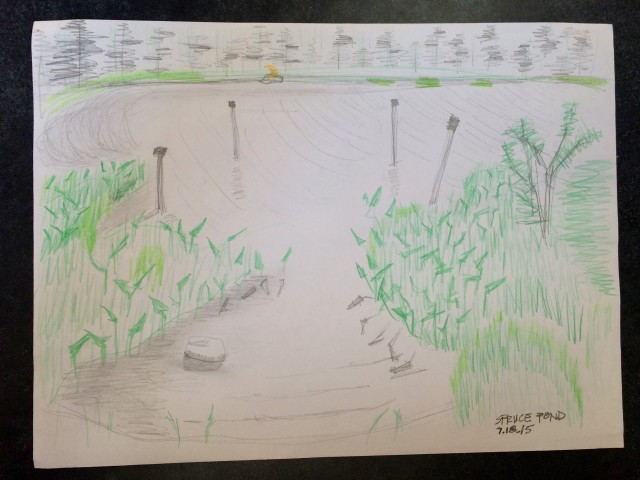
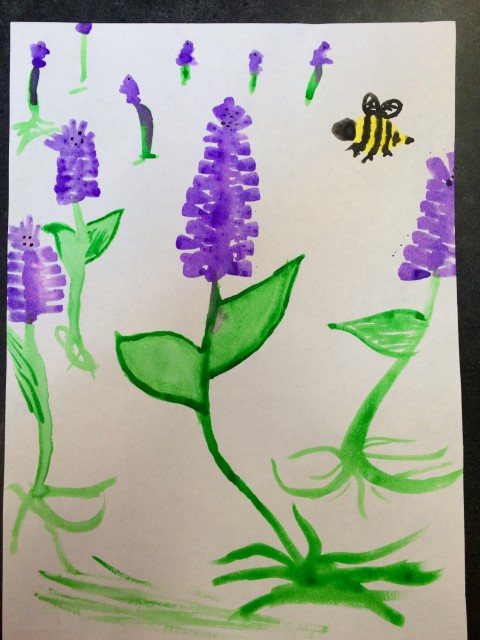
At that moment I was overcome with emotion for these 4 women for we all shared special parts of ourselves with each other, some of us strangers 2 hours prior. Elaine surprised me by giving me her sketch of the pond, but to my amazement she had gotten up before the rest of us were finished and sketched the four of us sitting on the benches. I will never forget this experience! We stayed on the benches a little longer, discussing thoughts and feelings, the still beauty of this pond in Bear Brook, and how as we get older, we become absorbed by the “big picture” and forget to look at the small details of life (and nature) and to be able and willing to sit and listen to what’s around you. Putting life’s stresses on hold isn’t always easy, but the healing powers of nature are innumerable and cannot be substituted in any way.
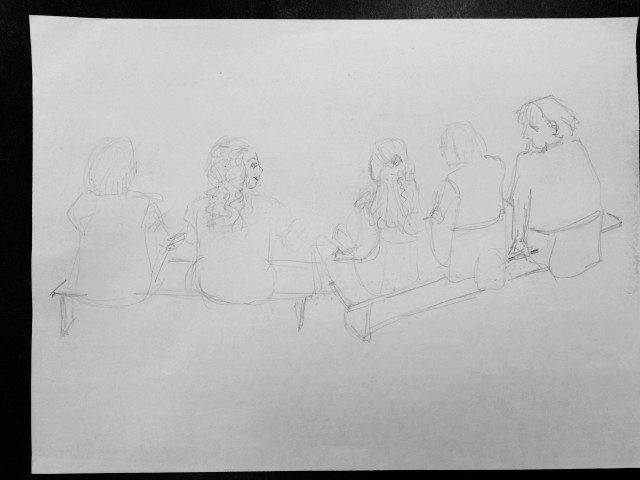
I walked my new friends back to the camp store, where we hugged each other goodbye, and I was still overcome with smiles and all of the warm fuzzy feelings imaginable. This was a huge highlight of my summer, and although I didn’t share all of the intimate details, just writing about it inspires me and gives me hope for what special wonders will happen this weekend.
–Christie Conway, Interpretive Ranger at Bear Brook State Park
